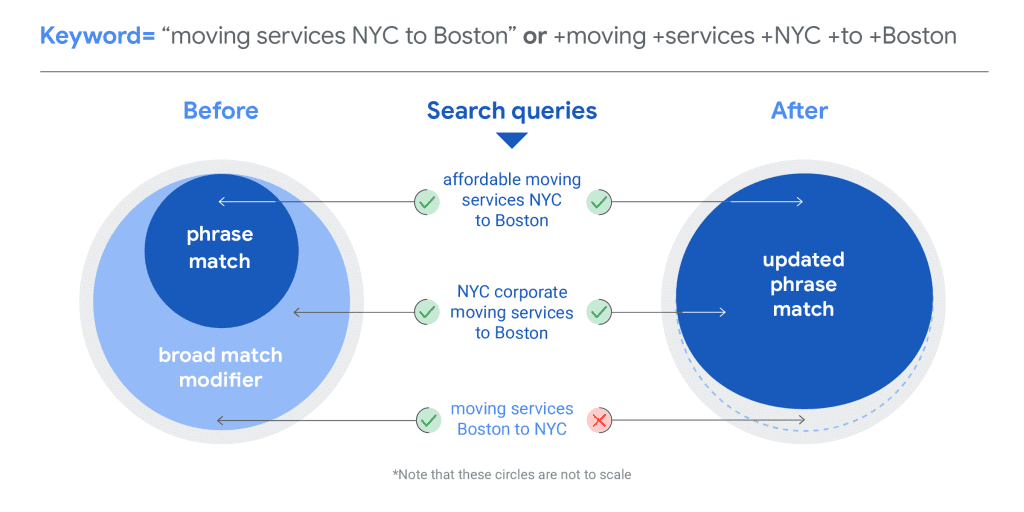Google announced yesterday that they’re changing how keyword match types work (yet again).
In particular, the following news set the PPC corners of the internet alight:
- Google is changing phrase match keywords to behave more like broad match modifier (BMM) keywords.
- Google is killing off BMM keywords entirely.
However, they also announced other more subtle changes at the same time. Many seem to be overlooking these updates, but we think they’re just as important.
But first, let’s take a quick look at how phrase match and broad match modifier are evolving.
The New Phrase Match
Phrase match keywords will now pick up similar traffic to BMM keywords.
Which means they’ll match with search queries that contain the individual words in the keyword regardless of word order.
However, there’s one key difference: the new phrase match will take into account word order when it changes the search query’s intent.
To illustrate, Google shared the following diagram:

In this example, the new phrase match keyword “moving services NYC to Boston” will trigger for a range of queries, regardless of word order.
However, when the word order changes the intent of the query — for example, if someone is moving the other way, from Boston to NYC — then the new match type will realise this, and an ad won’t be shown.
This means the new phrase match will pick up a lot more relevant traffic than the old phrase match. But it won’t bring in as much irrelevant traffic as BMM.
The King Is Dead. Long Live The King
We’ve long been fans of BMM keywords.
They’re a brilliant way to show for a wide range of relevant Google queries … without having to think of every possible permutation of how someone could search for your product or service.
The new phrase match will retain this, with the added benefit of automatically not showing for as many obviously irrelevant searches.
Furthermore, with one match type now doing the work of two, you can use fewer keywords in your campaigns.
This will make keyword management simpler, allowing you to focus more of your time on the big strategic decisions your account needs to continue to thrive.
What You Need To Do
These changes will start to be rolled out from the 18th February.
Once the changes have been implemented, all of your existing phrase match and BMM keywords will behave like the new phrase match keywords.
At that point, we’d recommend:
- Reviewing what keyword match types you have. If you have a phrase match and a BMM version of the same keyword, consider pausing one of them.
- If you previously used phrase match keywords but not BMM keywords, pay closer attention to your search terms. You’ll be showing for a wider range of queries, so you’ll want to ensure you’re only showing for the most relevant searches.
Changes To Broad Match
Google also announced they’ve made changes to broad match keywords.
Broad match keywords have historically been … imperfect … at delivering quality traffic. They tended to show for a wide range of completely irrelevant search queries.
Which would bring your website huge traffic, but it was traffic that rarely converted.
However, broad match keywords will now make greater use of machine learning to reduce the number of irrelevant queries they show for.
And combined with a smart bidding strategy — such as Target CPA or Target ROAS, which are our two favourites — broad match keywords now have the potential to bring in lots of additional traffic that will actually convert.
In theory, anyway.
If you’re running an existing campaign with a smart bidding strategy, it’s certainly worth experimenting with.
Changes To Exact Match
An exact match keyword that is identical to a search query will now always be chosen for the match, rather than any other keyword.
For example: previously, the query “women’s shoes” could match with any of the following keywords:
- [womens shoes]
- “womens shoes”
- +womens +shoes
- womens shoes
- [girls shoes]
Not only did this muddy how high you should set your bids for keywords of different match types, but it also complicated account structure (as you needed lots of negative keywords to ensure queries were being matched with the right keywords).
However, now that query will only match with [womens shoes].
This means you can now use fewer negative keywords, and you can set your bids for different match types with greater confidence.
Our Thoughts
There’s a certain level of doom and gloom in the PPC corners of the internet about these changes.
But we think they’re a net benefit.
These updates have the potential to simplify keyword management — which will mean more time to focus on the big strategic picture — whilst also bringing in additional high-quality traffic.
Our only word of caution is to keep checking your search terms reports.
We know Google says the traffic will be relevant, but we’d highly recommend you confirm this for yourself. And if it’s not relevant, there are steps you can take to remedy that. Read more in our article Block Crappy Traffic: How To Use Negative Keywords.








